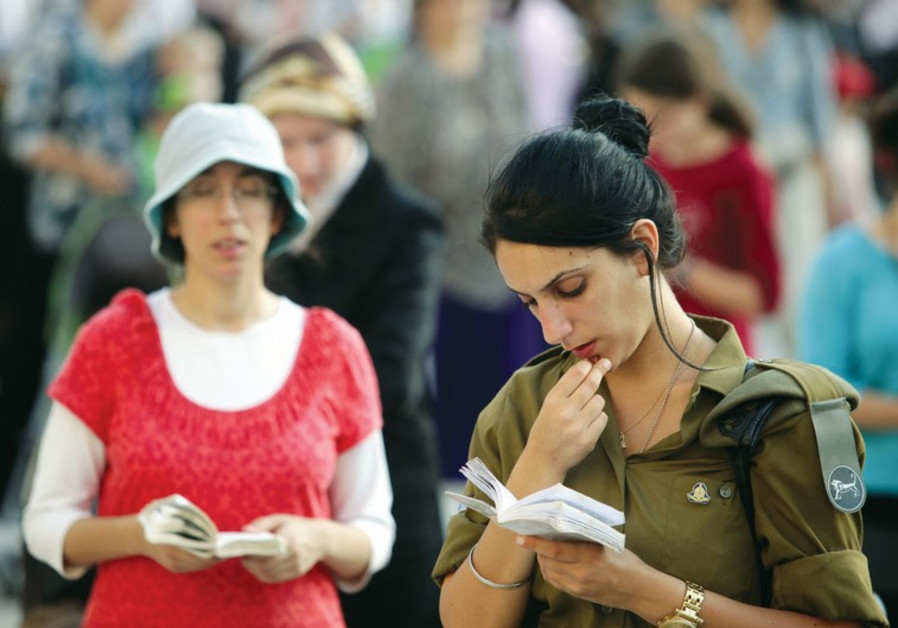Female, haredi soldiers have in the past been ridiculed for their decision to enlist in the army.

Lawmakers on the Left and Right expressed concern that new policies of the Civilian-National Service Authority are discouraging students in National Religious girls schools from enlisting in the IDF.
The Knesset Foreign Affairs and Defense Committee met on Thursday to discuss the authority’s proposal to bring dayanim (religious judges) to the schools so that girls could declare before them that they are religious, and thus receive exemptions from IDF service.
Currently, ulpanot, Orthodox- Zionist girls schools, have pupils whose religious beliefs do not allow them to serve in the military sign up together for an exemption, which is sent to the rabbinical courts, or religious girls can send a declaration that they don’t want to serve to the IDF on their own.
The number of Orthodox female soldiers has more than doubled, rising from 930 in 2010 to 2,000 in 2015, despite the haredi-dominated Chief Rabbinate and many Orthodox- Zionist rabbis and institutions saying that it is against Jewish law for women to serve in the army. In recent months, an Orthodox-Zionist organization put out a crude, controversial online cartoon against religious women in the IDF, as part of an organized campaign in the community.
Agriculture Minister Uri Ariel (Bayit Yehudi), who overseas national service, said that the idea is to make asking for a religious exception more accessible, so they don’t need to travel out of their town and waste time and money.
“We see National Service as an important and good thing,” Ariel said.
Meretz MK Michal Rozin said the initiative “comes out of panic and hysteria.”
Having judges come to the school, forcing girls to declare they want a religious exemption from the IDF in front of their teachers, will place undue pressure on those who do want to serve in the military, Rozin added, and MK Mickey Levy of Yesh Atid made similar comments.
MK Rachel Azaria of Kulanu, who is Orthodox and served in the IDF, said it would have been very difficult for her as a 17-yearold to stand up for herself if the rabbinical judges came to her class.
“This is a predatory way to encourage draft evasion,” Likud MK Anat Berko argued, lamenting “incitement” against girls who wish to serve in the IDF.
Zionist Union lawmaker Merav Michaeli called it “state-sponsored encouragement of draft evasion.”
“This is hypocritical and discriminatory,” Michaeli said.
“There are girls whom no one asks if they want to go to the army. This isn’t good for Israel, not good for our security, and very bad for these women.”
Brig.-Gen. Eran Shani , head of the IDF Manpower Planning Unit, said that the army encourages religious women to enlist, and allows them to serve without changing their lifestyle.
“The procedure is that whoever studied in a religious institution can send us a declaration on her own in different ways, including together from the ulpana,” he said.
MK Aliza Lavie (Yesh Atid), a religious woman who served in the IDF, and has one daughter who did the same and another who did national service, said it was important to allow the students to decide on their own, without added pressure.
“Recently, there is more and more cynical use of all kinds of tools to dissuade religious girls from serving in the army,” Lavie said. “The Education Ministry does not make information accessible to religious girls, and they are not aware… We are familiar with the distress it causes in school when teachers enlist in a cause, which is why I proposed a bill that girls should give the declaration directly to the IDF or a religious court, but not through a third party.”
Ram Zahavi, director of Religious Education in the Education Ministry, said religious schools go by the halachic rulings of the rabbinate, which state that girls should not enlist in the army.
“We teach Halacha, but at the same time, our education processes allow and direct every student to make personal choices,” he said.
Several MKs were outraged by Zahavi’s comments. Levy asked if that means religious schools discourage IDF service.
“You are destroying religious girls’ futures,” Lavie said.
“Your education system calls not to enlist in the IDF,” Rozin said, and Bayit Yehudi MK Moti Yogev shouted back, referring to secular schools, “Your education system calls not to enlist in the IDF!” By the end of the meeting, Justice Ministry representative Dror Granit said that they are working on ways to make the judges more accessible without having them come to schools.
Sar-Shalom Jerbi, head of the Civilian-National Service Authority, said an arrangement outside of schools would be a good thing.
As reported by The Jerusalem Post
